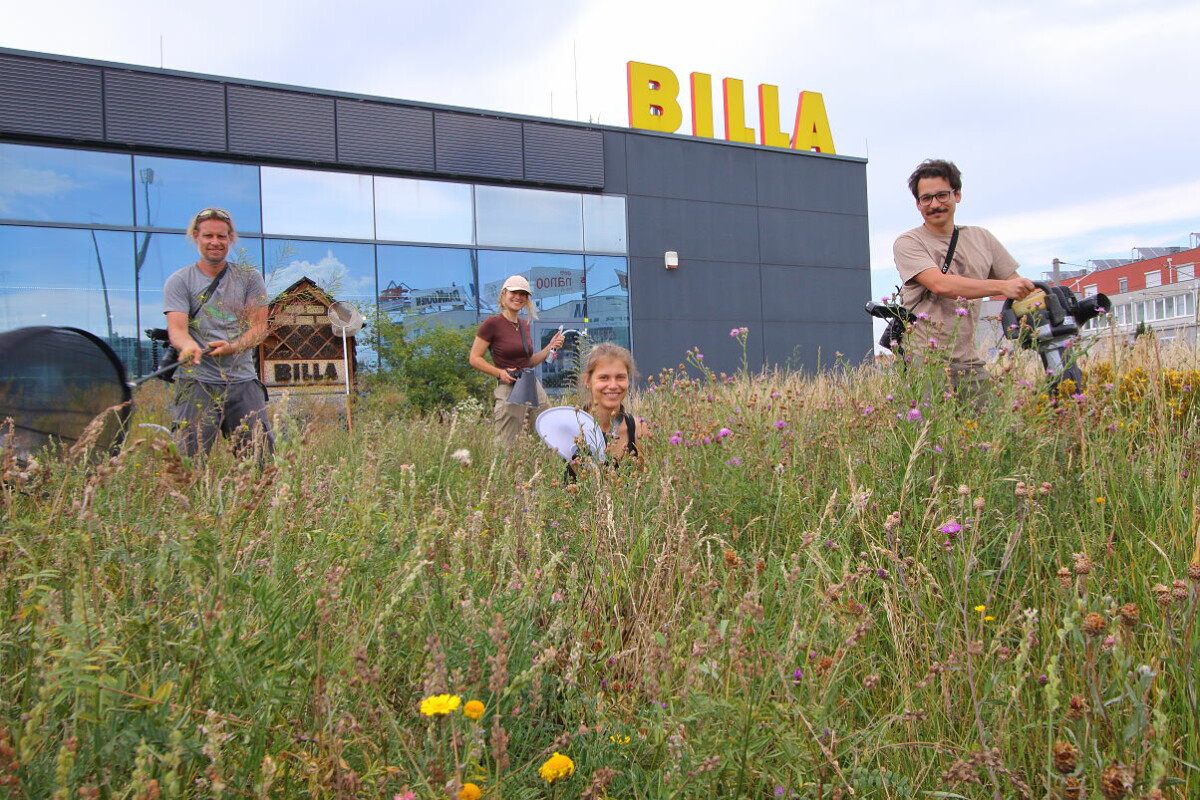The zoological monitoring, led by Dr Gernot Kunz, examined a total of 20 renaturalised green spaces between 210 m2 and 810 m2 at BILLA stores in Lower Austria as well as a lawn mower meadow in Styria that is still intensively managed with regular mowing. The monitoring revealed that up to 330 species occur on the renaturalised flowering areas. On the intensively managed meadow, only around 190 species.
"The study shows that properly managed and renaturalised green spaces at BILLA supermarkets are already important stepping stone biotopes and even core habitats for numerous endangered and endangered species, thereby helping to safeguard our biodiversity. With well over 1,000 species - some of which are highly endangered - including plants and fungi, the BILLA shops analysed make an important contribution to the conservation of local flora and fauna. A gradual expansion of these measures to green spaces at BILLA stores throughout Austria is underway," says project manager Dr Gernot Kunz.
Together with Dr Gernot Kunz, a further 15 experts were involved in the monitoring. They identified and collected the following species groups: Bugs, beetles, short-winged beetles & ground beetles, mites & springtails, bumblebees, reptiles, amphibians, bats, dragonflies, plant wasps, grasshoppers, cicadas, butterflies, wild bees, digger and wrinkle wasps, birds, grasshoppers, web-flyers, leaf fleas, cockroaches, earwigs and arachnids. Among the species observed in the renaturalised areas are several ‘endangered’ and ‘critically endangered’ species such as the large maple beetle (Ropalopus clavipes), the colourful ash borer beetle (Anthaxia podolica), the yellow beetle cicada (Agalmatium flavescens), the colourful wormwood leaf cicada (Eupteryx adspersa), the sulphur ant cicada (Tettigometra sulphurea), the thick-headed cicada (Anaceratagallia laevis), the large spittlebug (Aelia rostrata) and the hairy stilt bug (Berytinus hirticornis). In the group of butterflies, a total of 67 species were recorded, 18 of which were butterflies. Special species include the Carniolan ramshorn butterfly (Zygaena carniolica), which is classified as vulnerable (endangered) according to the Red List of Austrian moths, as well as the red fritillary and the small sainfoin blue among the butterflies. There are only a handful of current records from Austria of some registered species such as the ground beetle (Lebia humeralis) and the Ligurian mason bee (Osmia ligurica). In comparison, the intensively farmed reference areas perform very poorly in terms of species diversity, and there is also a lack of species relevant to nature conservation. All animals observed were documented photographically by the biologists and placed on the iNaturalist reporting platform in collection projects and an umbrella project. In this way, 300 additional identifiers, mainly from Europe, were recruited to verify the uploaded datasets. In addition, all collected data sets are publicly accessible and are available for biodiversity research and nature conservation. Individual species that could not be identified with photos were collected and analysed in the laboratory for genital morphology.
"In times of global species extinction, we all have an obligation to organise areas that have been intensively farmed in a natural way. By renaturalising green spaces, BILLA is sending out a clear signal that regional extinction processes can also be reversible. Rare butterflies are a thank you for this," says Dr Peter Huemer, Chairman of Blühendes Österreich and curator of the natural history collection of the Tyrolean Provincial Museums.
BILLA has been renaturalising green spaces around its stores into natural meadows since 2018. So far, around 30,000 m2 of land at 40 BILLA and BILLA PLUS locations have been converted into flowering meadows. Since the beginning, the project has been supported by nature conservation experts and organisations such as the Thermenlinie-Wienerwald-Wiener Becken landscape conservation association at many locations south of Vienna. A large proportion of the seeds come from the REWISA seed network. As part of the project, the gardening companies commissioned were also trained in nature conservation by the nature conservation experts.
Another new standard for newly built BILLA and BILLA PLUS stores is extensive greening in the form of trees, natural meadows and green roofs and façades. These are carried out on the basis of a specially created manual, ensure a cooling microclimate and promote biodiversity. The BILLA PLUS in Baden and the BILLA in Oberwaltersdorf, among others, shine in lush greenery.
The study by Dr Gernot Kunz can be read here: Billa Biodiversitätsflächen Dachprojekt · iNaturalist












